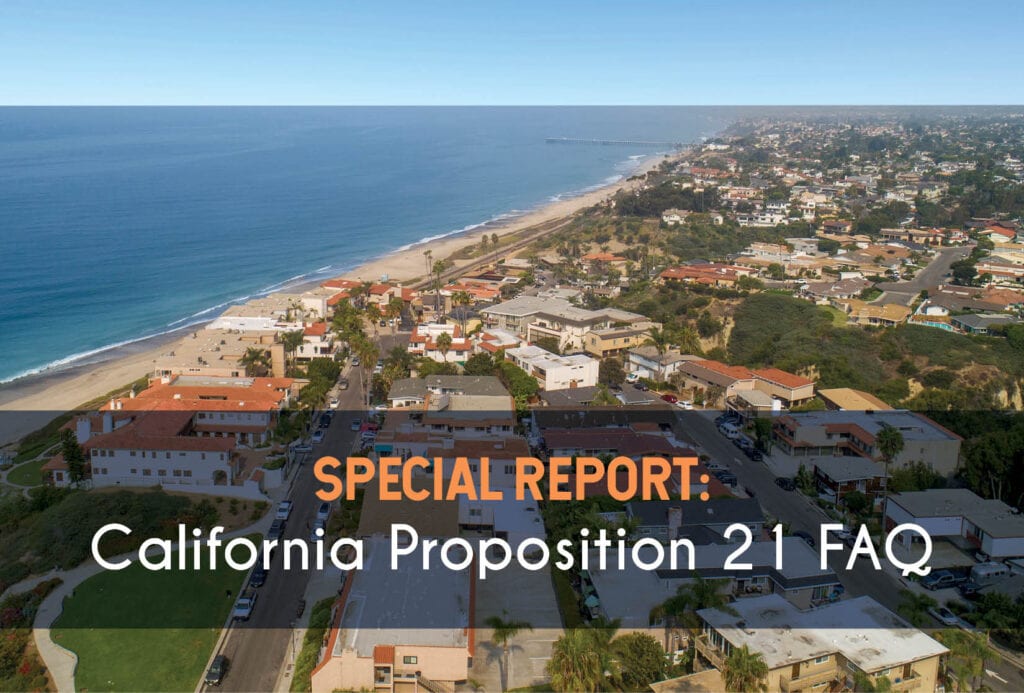Q: What is Proposition 21?
Proposition 21 is an initiative on California’s November ballot that will repeal the current statewide Costa-Hawkins law that mandates how local governments can implement rent control measures. Under the proposition, cities and counties with rent control will prevent owners from raising rents to the market rate upon vacancy and vastly increase the number of units that can be controlled by rental boards.
Q: How will vacancy control work?
Vacancy control would apply in jurisdictions that put rent control ordinances in place. In lieu of moving rents to the market rate upon vacancy, the owner may only increase rent 15 percent above the rate the previous tenant paid. That 15 percent can be achieved over the first three years of a new tenancy, including entirely during the first year. In addition, owners can apply the increase allotted by local rent boards on top of the 15 percent.
Q: Does Proposition 21 mandate vacancy control or is it optional?
Any rental properties covered by a new local rent control ordinance, and therefore Proposition 21, will fall under vacancy control. Properties under the statewide measure Assembly Bill 1482 can continue to have rents increase to the market rate upon vacancy.
Q: If Proposition 21 passes, will it be retroactive? How fast would cities be able to implement vacancy control?
Proposition 21 is not retroactive. If passed, the initiative will be effective within 30 days of the certification of the vote or January 1, whichever is sooner. Typically, January 1 is earlier. After that time, it will be up to cities to enact their newfound authority under Proposition 21. Prior to Costa-Hawkins, five cities in California had vacancy control.
Q: Do rent control measures transfer to new owners after a sale?
There are no provisions in Proposition 21 to remove a property from rent control, including transfer of ownership.
Q: What is the current policy on evictions?
The CDC has suspended evictions nationwide until Dec. 31, 2020. In California, Assembly Bill 3088 extends some protections into 2021. If a tenant declares a financial hardship due to COVID-19 each month from September to January and pays at least 25 percent of rent, they will be protected from eviction until Feb. 1, 2021. Unpaid rent will be rolled into consumer debt and recoverable in small claims court.
Q: How will Proposition 21 be enforced?
Upon approval by the voters, rent control enforcement will move back to the local level and enable cities and counties to pass rent control measures or alter existing laws. Rental boards predominately manage and enforce the local regulations.
Q: Which multifamily units are included?
Properties with a certificate of occupancy within the past 15 years are excluded. The only other exemption provided under the initiative applies to owners with less than three units that hold those units as a natural person.
Q: If Proposition 21 passes, does it become the statewide standard?
Proposition 21 will apply in cities and counties that decide to adopt the type of rent control allowed by Proposition 21. In those cities and counties that do not adopt Proposition 21 style rent control, the state law — created by AB 1482 — will apply.
Q: What is a landlord’s right to a fair return?
Proposition 21 does not define a fair rate of return. While the courts have ruled that rent control laws must allow landlords to receive a “fair rate of return,” it will be left to owners to petition a local rent control board in order to obtain a larger rent increase than allowed under the local law.
Q: Will Proposition 21 encourage apartment owners to convert units to short-term rentals like Airbnb?
Major municipalities that offer rent control in California have ordinances in place that would block that avenue. In Los Angeles, for example, a limit on the number of days and units one can offer on Airbnb already exists.
It is too soon to tell how lenders will alter their behavior in the wake of an approved initiative. As cities and counties pursue rent control measures, lenders are expected to modify their underwriting criteria based on those specific ordinances. It is reasonable to expect a decrease in valuation and cash flow will reduce loan proceeds.
Both developers and lenders will have lower motivation to pursue some projects that will fall under rent control within 15 years of development, particularly Class A assets in core locations where development costs are elevated and the timeline for investment recovery is elevated. Furthermore, without a provision to ever bring rents back to market rate, the impetus for reinvestment into older properties is removed.
There is no mechanism to pass through renovation expenses in the proposition.
CLICK HERE FOR DOWNLOADABLE REPORT
The information contained in this report was obtained from sources deemed to be reliable. Every effort was made to obtain accurate and complete information; however, no representation, warranty or guarantee, express or implied, may be made as to the accuracy or reliability of the information contained herein. This is not intended to be a forecast of future events and this is not a guaranty regarding a future event. This is not intended to provide specific investment advice and should not be considered as investment advice. Source: Marcus & Millichap Research Services

